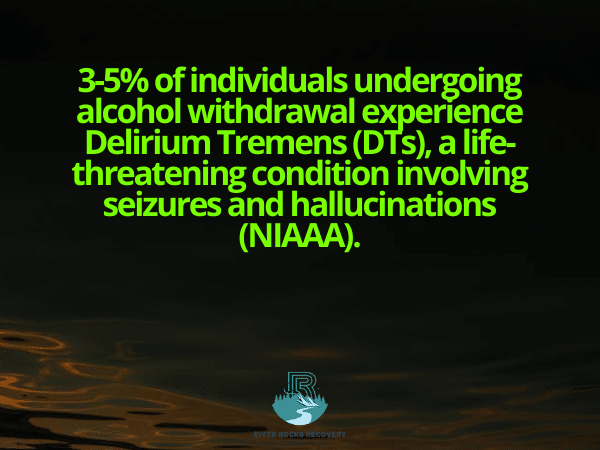Quitting alcohol is a courageous decision that can significantly improve your physical and mental well-being, as well as your relationships and overall quality of life. However, for many individuals, the journey to sobriety is more complex than simply deciding to stop drinking. Alcohol dependency involves physical, emotional, and psychological components that can make quitting on your own extremely challenging—and, in some cases, dangerous.
While some individuals manage to quit alcohol without formal treatment, seeking professional help through an Alcohol Rehab Program or Alcohol Addiction Treatment Program can greatly improve the chances of success and ensure safety throughout the process. At River Rocks Recovery, we offer comprehensive care, including Partial Hospitalization Program (PHP), Intensive Outpatient Program (IOP), and Sober Living Program, to help individuals overcome alcohol addiction and achieve lasting recovery.
The Challenges of Quitting Alcohol Without Rehab
Quitting alcohol on your own, often referred to as “going cold turkey,” may seem like a viable option. However, alcohol addiction affects not only the body but also the mind, and addressing both requires a structured approach.
1. The Physical Dependence on Alcohol
- Prolonged alcohol use alters the brain’s chemistry, leading to dependency.
- Sudden cessation can trigger withdrawal symptoms, ranging from mild (nausea, sweating) to severe (seizures, delirium tremens).
2. The Psychological Struggles
- Alcohol often becomes a coping mechanism for stress, anxiety, or depression.
- Quitting without addressing these underlying issues can lead to emotional instability and relapse.
3. Lack of Support and Structure
- Recovery requires accountability, support, and a safe environment, which can be hard to achieve without professional guidance.
What Are the Risks of Quitting Alcohol Without Professional Help?
While some people can quit alcohol on their own, for many, the risks outweigh the benefits.
1. Dangerous Withdrawal Symptoms
- Mild Symptoms: Anxiety, irritability, insomnia, nausea, and sweating.
- Severe Symptoms (Delirium Tremens – DTs): Hallucinations, confusion, seizures, and high blood pressure.
- Fatal Risks: In severe cases, alcohol withdrawal can be life-threatening without medical supervision.
2. High Risk of Relapse
- Without the tools and strategies provided in a rehab program, many individuals relapse due to cravings, stress, or lack of support.
- Relapse increases the risk of alcohol poisoning, particularly after a period of abstinence.
3. Failure to Address Underlying Issues
- Mental health conditions, unresolved trauma, or stress often drive alcohol use.
- Without addressing these root causes, quitting alcohol becomes a temporary solution rather than a lasting change.
Why Professional Help is Important
Professional help for alcohol addiction provides a structured strategy that is tailored to your specific needs. Here’s why it is so important:
1. Safe Detoxification
In the absence of medical care, alcohol withdrawal can be unpredictable and deadly. River Rock Recovery and other rehab centers offer medically monitored detox programs to help patients manage their symptoms safely and successfully.
2. Addressing the Underlying Issues
Trauma, mental health issues, or unresolved emotional distress are frequently the root reasons for addiction. Professional rehabilitation programs provide therapy to address these concerns, ensuring a thorough approach to recovery.
3. Personalized Treatment Plans
Each person’s addiction journey is unique. To promote holistic healing, rehabilitation centers provide tailored treatment plans incorporating counseling, group therapy, and wellness activities.
4. Creating a Strong Support System
Quitting alcohol is more than just stopping drinking; it’s about developing a sustainable lifestyle. Rehab programs encourage connections with counselors and peers who have had similar experiences, allowing you to develop a support network for long-term recovery.
5. Preventing Relapse
Professional assistance provides you with techniques for managing triggers, dealing with stress, and rebuilding your life. Rehab clinics frequently include aftercare services to help you stay sober.
How Professional Rehab Can Help You Quit Alcohol Safely
Enrolling in an Alcohol Addiction Treatment Program or Alcohol Rehab Program provides the resources, structure, and support needed for a successful recovery.
1. Medically Supervised Detox
- Safety First: In a professional setting, withdrawal symptoms are monitored and managed to ensure safety.
- Medication-Assisted Treatment (MAT): Medications like benzodiazepines may be used to ease withdrawal symptoms and prevent complications.
2. Personalized Treatment Plans
- Every individual’s journey is unique, and rehab programs create tailored plans to address specific needs.
- Treatment plans often include therapy, support groups, and holistic approaches like mindfulness or exercise.
3. Access to Evidence-Based Therapies
- Cognitive Behavioral Therapy (CBT): Helps individuals identify and change negative thought patterns.
- Dialectical Behavior Therapy (DBT): Focuses on emotional regulation and coping strategies.
- Trauma-Informed Care: Addresses the impact of past trauma on addiction.
4. Structured Support Programs
- Partial Hospitalization Program (PHP): Provides intensive care during the day while allowing individuals to return home at night.
- Intensive Outpatient Program (IOP): Offers flexibility for those balancing treatment with work, school, or family responsibilities.
- Outpatient Program: Provides ongoing support for individuals transitioning out of more intensive care.
- Sober Living Program: A safe, structured environment that helps individuals build accountability and long-term sobriety.
5. Peer Support and Accountability
- Group therapy and peer support programs foster connections with others who share similar experiences.
- Being part of a supportive community reduces feelings of isolation and provides encouragement during challenging times.

Benefits of Professional Help for Alcohol Addiction
Seeking professional help significantly improves the chances of achieving and maintaining sobriety.
1. Increased Success Rates
Studies show that individuals who participate in professional rehab programs are far more likely to maintain long-term sobriety compared to those who attempt to quit on their own.
2. Relapse Prevention
Rehab programs teach practical skills for managing cravings, avoiding triggers, and handling high-risk situations.
3. Holistic Recovery
Rehab focuses on healing the mind, body, and spirit, promoting overall well-being.
4. Addressing Co-Occurring Disorders
Integrated care ensures that mental health conditions like anxiety, depression, or PTSD are treated alongside addiction.
Who Should Consider Professional Help?
Professional rehab is particularly recommended for individuals who:
- Experience severe withdrawal symptoms when trying to quit.
- Have a history of relapse.
- Use alcohol to cope with mental health challenges.
- Lack a supportive and structured environment at home.
If any of these apply to you or a loved one, seeking help from an Addiction Treatment Center in Ohio like River Rocks Recovery can make all the difference.
How River Rocks Recovery Can Help
At River Rocks Recovery, we provide comprehensive, evidence-based care to help individuals quit alcohol safely and successfully.
Our Programs Include:
- Alcohol Rehab Program: Holistic care that addresses the physical, emotional, and psychological aspects of addiction.
- Partial Hospitalization Program (PHP): Structured day treatment with access to intensive therapy.
- Intensive Outpatient Program (IOP): Flexible care that supports recovery while allowing individuals to maintain daily responsibilities.
- Outpatient Program: Continued therapy and support for individuals in long-term recovery.
- Sober Living Program: A safe, alcohol-free environment that fosters accountability and independence.
Our Approach Includes:
- Trauma-Informed Care
- Cognitive Behavioral Therapy (CBT)
- Group and Individual Therapy
- Family Therapy and Support
Conclusion
Quitting alcohol without professional help may seem appealing, but it often involves significant risks and challenges that can derail recovery. Professional programs like those offered at River Rocks Recovery provide the structure, support, and tools needed to achieve lasting sobriety.
If you or a loved one are ready to take the first step toward recovery, call us today at (888) 905-6281 to learn more about our Alcohol Addiction Treatment Program and other services. Let us help you build a healthier, alcohol-free future.
FAQ for Quit Alcohol Without Rehab
Can I quit alcohol on my own?
While some people can quit alcohol without professional help, the process can be challenging and dangerous, especially for those with a dependency. Professional rehab provides the support and safety needed for lasting recovery.
What are the risks of quitting alcohol without rehab?
Risks include severe withdrawal symptoms like seizures or delirium tremens, a higher likelihood of relapse, and failure to address underlying mental health issues or trauma.
How does professional rehab help with alcohol addiction?
Professional rehab offers medically supervised detox, therapy to address root causes of addiction, and ongoing support to prevent relapse. Programs like Partial Hospitalization Program (PHP) and Sober Living Program provide structured care and accountability.
What treatments are used in alcohol rehab?
Rehab programs often include Cognitive Behavioral Therapy (CBT), trauma-informed care, group therapy, and Medication-Assisted Treatment (MAT) to ease withdrawal and reduce cravings.
What are the benefits of a professional Alcohol Addiction Treatment Program?
Benefits include increased safety during detox, personalized treatment plans, effective relapse prevention strategies, and support for co-occurring mental health conditions.




























